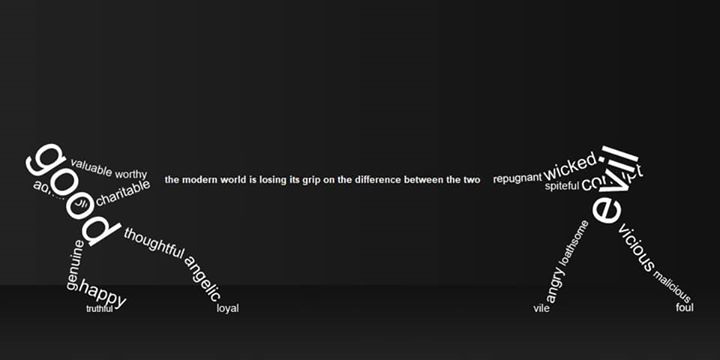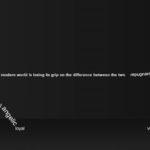
First, let me just say that what follows regards a complex subject, as such, it demands of interlocutors a degree of critical adeptness that is not common among the general public (yeah, bite me).
I however have seen among you some that seem fit to engage the subject, if those people comment, I’ll be more than glad to engage them.
Nonetheless, I will not be engaging everyone. Any comment that twists my words, that misrepresents the sentiments in why is to follow, will be ignored.
I will however be elaborating further on demand. As well as attempt to make anything clearer upon being politely asked to.
My primary intention here is to give you christians a perspective on morality that differs from yours. One that is descriptive and not prescriptive. Please note that this is my own opinion on morality, not many atheists subscribe to it. I am a moral realist, as well as a consequentialist to some extent.
Though neither label fits my perspective completely.
Note that I am a hard determinist, I do not believe in free will, or even in the existence of the ego, whatever impression to the contrary the format of my writing might give. I assume those things to be true, though will not be disputing either here.
Ok then, here is how this atheist sees morality:
In nature, one can find regularities, recurring patterns. These allow us to abduct hypothesis from them, such is called inference to the likeliest explanation.
So, I took it upon myself to observe phenomena related to morality in an attempt to determine if there are regularities within it that may enable me to abduct an explanation from them. To my lack of surprise, there were many. Not only that, but philosophers such as Steven Pinker had already written a book about some of them, though his explanation differs from mine.
Some of these regularities are:
1. for as long as humans have existed, they have regarded as good, that which they believe to lead to some beneficial gain or preclusion of harm. Take for instance human sacrifice, people that regarded it as good, thought it to appease gods.
2. Beliefs of what is good and bad change over time.
3. The changes over time of these beliefs have followed a single direction trend. They have increased the quality of our conscious experience, the extent to which we find pleasure in live.
4. Notions of Good, bad, etc. Are used as justifications for behavioral tendencies.
5. These notions are connected to conceptual models of reality.
6. Revolutions on these notions are achieved not by reason, but violence. That is to say that for example, people did not gathered and discussed whether slavery was bad or good, found a consensus and then changed their ways. Rather the posture of slaver being bad had to be enforced and propagated by means of muskets and swords.
7. Changes in notions of good and bad entail changes or modifications in the conceptual models of reality that they are part of. That is to say for example, that religious conceptual models of reality are modified as to incorporate changes in aptitude regarding what is good and bad. Basically, religions and politics change along side our notions of good and bad.
8. Our notions of good and bad become more alike over time.
9. Often differing conceptual models of reality contain the same notions of good and bad though they are explained through differing narratives. That is to say that the Christian May say that killing is bad because it is a sin and takes you hell, while an Indian says that it is because it leads to reincarnating in a lesser animal.
I could go on, but I hope those suffice to make the point.
So, there are regularities that demand an explanation. In science, one explains regularities through natural mechanisms that are said to bring them about. And that is precisely what I did, however effective or ineffective I was at it.
My opinion on morality was as well developed through constant debate, over many years, with Christians but more often than not with atheists. It increased my appreciation for religion, I think of it as crucial to civilization, at least at our infancy.
I reason that in order to thrive in life, one must have a relatively accurate interpretation of reality. In the same manner that an accurate map of a city would allow you to navigate it effectively, a conceptual model of reality allows you to navigate it as effectively as it is accurate.
However, such conceptual models of reality must be modified or corrected through time. In the manner of cartographers and explorers, the more we find about reality, the more we will be required to modify our map of it. Not only that, but being that we are talking not just about one individual, but a conglomeration of communities, these conceptual maps must be able to be passed to each other. In this manner, we can explain all the regularities specified in this piece.
So, to my mind, religion gave us our first conceptual model of reality. Say, there was a god and it expected us to behave a certain way. It allow us to tell each other the way one should behave and why.
However, it is our unconscious brain that seeks and finds relationships among our responses to stimuli, and the conscious experience that ensues. If a behavioral response is identified by our brain to lead to some sort of pleasure or to preclude some sort of pain, it is selected.
Then our brain uses narratives-our conceptual models of reality-to justify and make sense of such behavioral response. The narrative need not be literally accurate, but the behavioral tendency does need to lead more often than not to some pleasure or away from some pain, or order for it to propagate within a community.
What I mean is that if however unlikely some action that often is not conducive to pleasure or away from pain, does in one instance to one individual, and he tells another that doing the such is good justifying with a particular narrative, the fact that such action is more often than not not conducive to pleasure or away from pain, will prevent it from being propagated writhing the community. It will not even be reinforced were the subject of the example try it again.
In that manner and over time, as our sociocultural environment changes, as we become capable of more actions, and our brain identifies pleasure leading behaviors, notions of good and bad as well as the narratives pertaining our conceptual models of reality will change.
Being it the case that human nature is the virtually the same independently of the individual, that is to say that what causes one pain or produces in one pleasure, tends to do the same for another.
Thus, one expects the behavioral tendencies of communities related to notions of good and bad to become more alike over time, even if the narratives that are used to justify them differ.
Well, that is in as simplest terms as I am able tu put it, the way I see morality. I do not pretend to tell what you should do, but rather explain what you do. To elucidate the natural mechanism behind our notions of good and bad as well as the behavioral tendencies in which these are manifested.
This is as I said, a descriptive theory. There is no ought/is conflict.
Feel free to share your criticism of it. At the very least, I hope you will concede that there is the possibility of a morality without god.


Comments